Race, Gender, Sex, and Rights Pulse Through DC’s One-Minute Festival
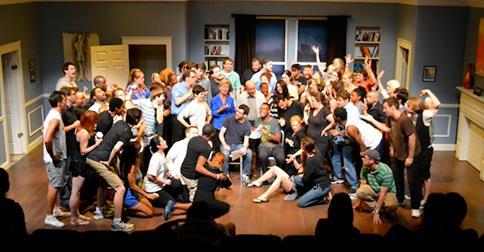
Photo courtesy of Patricia Davis.
Washington, DC recently experienced its first One-Minute Play Festival. Roundhouse Theater partnered with the New York-based One Minute Play Festival (#1MPF) to produce ninety new one-minute plays by more than sixty playwrights from the DC area. The playwrights, selected by invitation, represented a range of cultures, career levels, ages, and gender. Playwrights were not told what to write about, but were asked to consider moments that might be unique to this particular place and time. The OMPF, which originated eight years ago, has already built an annual partnership with more than twenty other cities. DC’s time had come.
The point of these festivals is not primarily to inaugurate or strengthen a new form—the haiku-like one-minute play—but rather, to strengthen the community. The actors and directors volunteer their time, and the festivals raise money for a local and usually theater-related cause. The proceeds from DC’s festival will support community education and new play programming at Roundhouse.
Connecting experimental drama, drag, the claimed ancestry of the French symbolists, Pride week in Boston’s South End: none of this was coincidental or exploitative marketing on Meehan’s part. Her decisions were principled and formal—truly based on a wrestle with ideas, and not cosmetically celebratory.
But the festival strengthens the community in others ways as well, allowing audiences to see numerous meditations on the life that surrounds them. The festival at Roundhouse unfolded as a kind of discourse on life in metro DC. Artistic director Dominic D’Andrea, who founded the #1MPF in New York, noted as he introduced the Washington festival, that common themes, ideas, and styles emerge, giving us a barometer reading of who we are as a community, and where we might be going.
The plays were grouped into ten sets of about ten one-minute plays, largely determined by subject matter or common themes. Each clump of plays had its own director and its own set of actors. While the continual, one-minute transitions to a new story made for a disjointed viewing experience, most of the plays worked, and some of them worked exceedingly well.
The first set of plays, directed by Lee Liebeskind, featured several Metro rides. Glenmont by Danielle Mohlman concerns a woman who runs into a former lover on the Metro, or maybe someone she is pretending is a former lover. She leaps onto him, straddling him and recounting old times, in spite of his failure to recognize her. In Red Line by Zachary Fernebok, a man strikes up a conversation with the woman beside him on the Metro, immediately asking her what she does. She avoids answering for as long as possible, instead enumerating her hobbies. When she finally reveals that she works for a not-for-profit aimed at preventing teenage pregnancy, the man refuses to engage with her anymore. While summarizing the plays cannot possibly do them justice, Red Line definitely gets at that most Washingtonian of questions—“What do you do?”—and the difficult task of partnering up in a city obsessed with work, egos, and politics of various kinds.
Everything Wrong with America, All in One Dude by Gwydion Suilebhan features a man held up in traffic by the passing presidential motorcade. Although he is only traveling to a barbeque, he is extremely upset as he has to get there early enough to network—there is a girl who is supposed to be there who can connect him to a gig.
The second set of plays, directed by Randy Baker and Deb Sivigny featured a couple of especially amusing plays. The Prince, by Ben Kingsland juxtaposed a Nigerian prince who needs to find someone willing to take a few million dollars of his inheritance and put it in their bank account, and a man who wants to share one tip to help people cut down their belly fat. They each wail on about their causes, continually ignored. Competitive Spirit by Jenn Book Haselswerdt featured two women, who rather than conversing, simply list their achievements—detailing the classes their children are taking, their latest social events (the White House Easter Egg Roll, the Kennedy Center Gala), and their addresses in neighborhoods where they live, each one striving to be cooler than the other.
Ryan Maxwell directed the third set of plays, which dealt with racism. Standouts here included Crispus Atticus in Heaven by Malcolm Pelles, who with humor and subtlety makes the point that the US took longer than France, Spain, and England to free slaves, and, yes, elected a black president, but not before South Africa did. Ben’s Chili Bowl by Bob Bartlett, and A Post Racial Lullaby by Psalmayene 24, made their points cleverly, humorously, and clearly. Explaining racism to her child, the mother in A Post-Racial Lullaby says she respects everyone. Just then, a black man approaches, saying, “Excuse me,” and she immediately retorts, “I don’t have any change.”
Sections four and five, directed by Kate Debelack and Gus Heagerty respectively, dealt with love and sex, though one play, Potty, by Patrick Flynn, bucked that trend: anxious, achievement-hungry parents consult a specialist, worried that their child is “slow” because he isn’t potty trained in spite of the parents taking a week off from work for this express purpose. Other particularly entertaining plays in these sections included Girl Child in the Promised Land by Jennifer Nelson, I Read it in the Washington Post so It has to be True by DW Gregory, and Status Update by Kristin Lepine.
A number of plays dealt with gentrification. Cleverly directed by Jennifer Mendenhall, these pieces ran the gamut. Red, Yellow, and Blue by Randy Baker featured three white people fleeing frantically on Segways from a black man who is chasing them, only, as it turns out, because they have unwittingly made off with his resume. Landmarks by Paige Hernandez is surprising and moving—a young woman recognizes nothing of the neighborhood in which she grew up except her father, now living on the streets, toddling along.
The plays in the seventh set, directed by Ty Hallmark, centered on struggles from the romantic to the political. To take on big questions in a one-minute play rather than simply going for an amusing piece of work is a tall order, but many of the plays throughout the festival hit their mark. In Jon Klein’s The Center Cannot Hold, a young woman has come to DC to exercise her rights as a citizen. She stands on a chair, asking whether anyone can hear her. Finally, a tourist approaches. To him, she is mute, frozen—a statue. He takes a selfie in front of her and leaves. In The Fight For by Kristy Simmons, two women comment on newspaper headlines extolling equal pay for women, wondering when it will be their turn to make what their male colleagues do. Love in a Red State, by Jacqueline E. Lawton, involves a shocking coat hanger abortion, a remedy reverted to in a state with restrictive abortion laws.
Breaking up the serious plays with the comedic was a successful strategy for the festival. Rich Eprey’s High Pretension was a very funny play in the eighth set, directed by Joshua Morgan. A young woman speaks to a therapist about her malaise since moving to DC. “I feel like I, I . . .” The therapist cuts in: “Have a pole up your butt?” High pretension, itself, is the final diagnosis.
Section nine, directed by Kelsey Mesa, had several moving and trenchant meditations on women’s rights and struggles. Mother’s Daughter by Renee Calarco, took a farcical approach to body image issues—a mother congratulates her daughter for learning so well to hate her body and consider herself fat. Entries by Thembi Duncan, took on the ever-present sexual harassment two women confront at work each day. Nicol

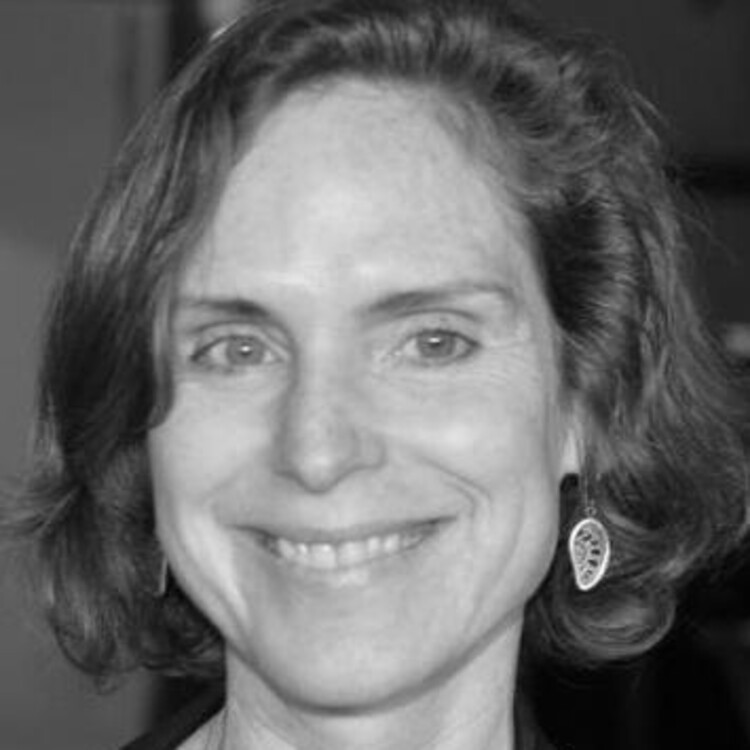
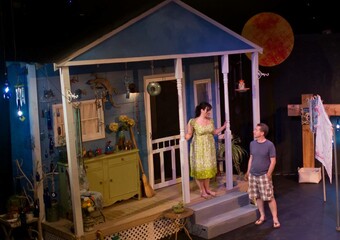

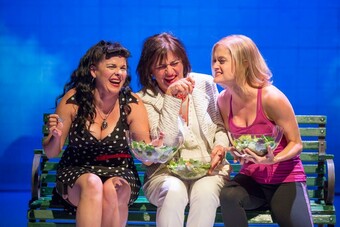

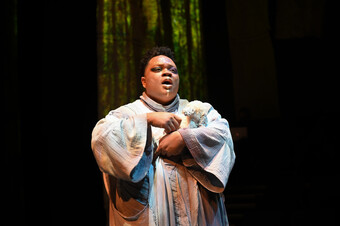

Comments
The article is just the start of the conversation—we want to know what you think about this subject, too! HowlRound is a space for knowledge-sharing, and we welcome spirited, thoughtful, and on-topic dialogue. Find our full comments policy here
Thank you for writing about the, Patricia! I had no idea you were doing a piece. This is a wonderful encapsulation on what we did. I do think one of our goals IS to strengthen, advocate, and advance the form along is with all of the community engaged frames of the work. I think over the past 8 years have and continue to do that. I'm thrilled that you were able to see/feel/hear the emerging themes, ideas, and topics that bubbled up so clearly in each clump. The magic of this work is that these connections come up in every city. In every city, each year, those connections are completely different. In that way the work becomes an incredible tool to look into our zeitgeist, names what's being said, and ponder what wasn't. Hopefully this gives us some clues about who were are, where we are, and in what direction we might be going. Thanks for this.